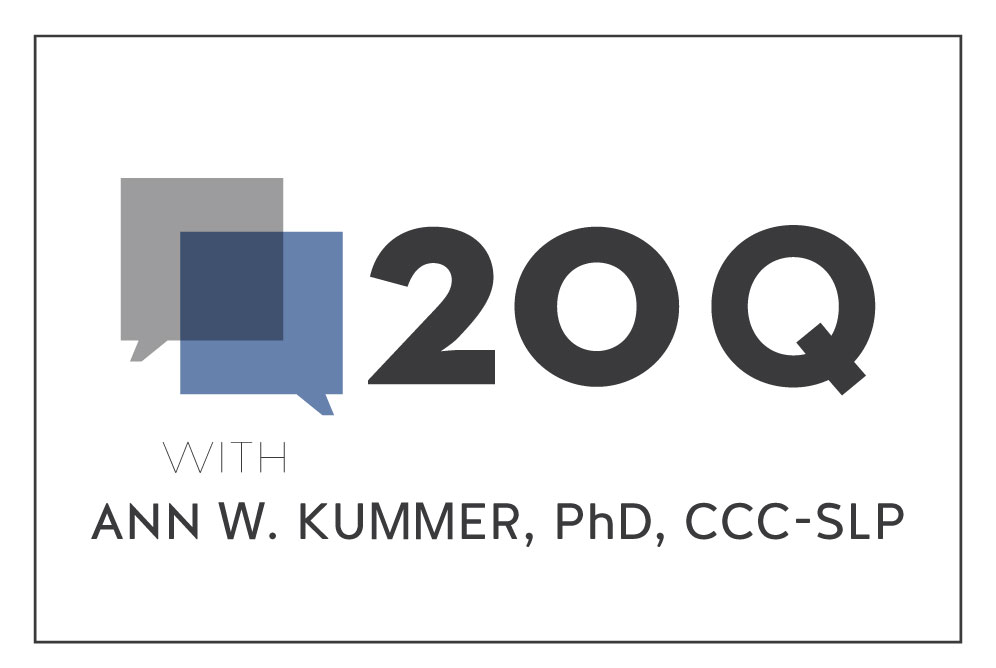From the Desk of Ann Kummer

I am so pleased to introduce this 20Q article on the subject of ethics in supervision. As you all know, ethics is a very important topic in our profession, as it is in others. It is so important that many professional licensure boards require yearly or biannual ethics training. For professionals who supervise others, it is particularly important to have a clear understanding of professional ethics. This is because the supervisor is responsible for not only teaching professional ethics, but also for modeling ethical behavior.
This 20Q article on ethics in supervision was written by my friend, Wren Newman, SLP.D, CCC-SLP. Dr. Newman received her Bachelor’s degree from Ithaca College, her master’s degree from University of Oklahoma, and her Doctor of Speech-Language Pathology degree at Nova Southeastern University. She is currently the Chair of the Department of Speech-Language Pathology at Nova Southeastern University. Dr. Newman has served on ASHA’s Board of Ethics and presently is on ASHA’s Committee on Nominations and Elections. She was the Coordinator of Special Interest Group 11, Administration and Supervision. As such, she has a particular interest in the ethical concerns that can present in the area of supervision.
This article will be of particular interest and value to anyone who supervises others, including students, clinical fellows, support staff, and other professionals.
Now...read on, learn and enjoy!
Ann W. Kummer, PhD, CCC-SLP, FASHA, 2017 ASHA Honors
Contributing Editor
20Q: Ethical Issues Associated with the Supervisory Process
Learning Outcomes
After this course, readers will be able to:
- Describe the responsibility of the supervisor in ensuring that the supervisee does not engage in unethical behavior
- Discuss the potential problems with dual relationships
- Describe what is needed regarding informed consent as it applies to supervision
 Wren Newman
Wren Newman1. I am wondering if the area of supervision and ethics applies only to the supervision of graduate students. I currently supervise a speech-language pathology assistant (SLPA) and have supervised a clinical fellow as well.
The supervisor’s responsibility is to assure all supervisees are behaving ethically whether support staff, support personnel, professionals from other disciplines, or professionals within the same area of practice. Therefore, supervision and ethical behavior go across all levels of supervision. The questions presented in this article generally pertain to the supervision of speech-language pathology graduate students or clinical fellows.
2. I have heard the term vicarious liability? What exactly does that term mean?
Vicarious liability means that a supervisor is responsible for the oversight of those whom he or she supervises. As a supervisor, the behavior of those whom you supervise is your responsibility.
A case frequently referenced in this area is the Tarasoff case (https://scocal.stanford.edu/opinion/tarasoff-v-regents-university-california-30278) which presented in the area of counseling. The case involved a graduate student who was working with a patient when the supervisor was not present. The patient discussed killing someone and the graduate student did not report the threat to the supervisor. The patient did, in fact, kill the person referenced. The supervisor was held legally responsible for the behavior of the student. The supervisor’s lack of awareness of the patient’s threat was not an acceptable justification.
Although we might not experience a case at this level of seriousness, we need to take the responsibility of supervision seriously and communicate frequently with supervisees to assure we are aware of any situations that present and that we have a good sense of our supervisee’s behavior and performance.
3. Can you provide an example of how vicarious liability applies to supervision and speech-language pathology?
An example might be in the case of a family where the parents are divorced and one of the parents does not have legal access to the record of their child. The parent who is not permitted access to the child’s records, requests copies of all reports and the graduate student provides the requested copies to the parent without checking the records for authorization to do so. Although it is the student’s error, the supervisor is responsible for the actions of the student. In this case, this situation is also a violation of HIPAA by both the supervisor and the supervisee.
4. Can you describe what informed consent is?
Yes, informed consent involves the agreement of an individual to a particular process. We are likely most familiar with informed consent as it applies to medical procedures however; it applies to the supervisory process as well. “Informed consent may be verbal, unless written consent is required; constitutes consent by persons served, research participants engaged, or parents and/or guardians of persons served to a proposed course of action after the communication of adequate information regarding expected outcomes and potential risks” (http://www.asha.org/policy/ET2016-00342/). This means, a patient, caregiver, and/or patient family should be informed the individual working with the family member is a graduate student, assistant or however the situation presents. The family should not think the individual is a licensed, certified speech-language pathologist (SLP) unless in fact the individual providing the service is a licensed, certified SLP.
5. How does informed consent apply to supervision?
If you are a licensed and certified SLP or audiologist working with a graduate student or assistant, patients/clients receiving evaluation or treatment including parents or guardians of children and adult clients and family members, need to understand a graduate student or assistant will be providing treatment under the supervision of a certified and licensed SLP. The patient and/or family member responsible for the individual need/s to be informed that a graduate student or a SLPA will be working with their family member under the supervision of a SLP.
6. Can you provide an example of an ethical issue in the area of informed consent?
An example of a violation of informed consent is as follows: a private practice includes a graduate student completing an externship at the site. Evaluations are conducted by the owner of the practice who is a licensed and certified SLP. Following the completion of the evaluation, the client is assigned to work with the graduate student rather than with a licensed and certified SLP. The family needs to be notified of the credentials of the individual who will be working with the family member. If the family is unaware of the clinician’s status as a graduate student completing clinical hours for graduation, then an issue with informed consent could present.
7. What is a dual relationship?
Dual relationship presents when in addition to the supervisory relationship between the supervisor and the graduate student or other supervisee, a second relationship already exists or develops.
8. How does dual relationship apply to supervision?
In our discussion of ethics and supervision, we recognize the evaluation component of the supervisory process. Supervisors provide feedback on how the supervisee is performing in terms of assessment, treatment, communication skills, implementation of suggested improvements, etc. In general, it is optimal for the supervisor to evaluate the strengths and weaknesses of the graduate student in the absence of other relationships with the student. For example, if the graduate student is dating the supervisor’s son or daughter and the relationship ends in a negative way, how will the supervisory relationship be impacted? If the supervisor’s child is upset/depressed, will the supervisor be able to provide feedback and evaluate the graduate student without the impact of the secondary relationship on the supervisory relationship? The supervisory relationship can be affected by the “other” relationship.
9. Would that be the primary example of how a dual relationship can affect a supervisory relationship?
Let’s say the supervisor is a woman and the graduate student is a man. During the time the graduate student is under the supervision by the supervisor, the supervisee and the supervisor begin a personal relationship. The difficulty presents in that the second relationship may affect the first relationship. The supervisor may not evaluate the supervisee based on his clinical work but rather based on the relationship between the two of them. Alternatively, the supervisee may not wish to continue the personal relationship but may be fearful of ending the relationship because of fear of the supervisor’s reaction. It is better not to complicate the supervisor / supervisee relationship with another relationship if possible.
10. Is a dual relationship always problematic?
No, a dual relationship is not always problematic. There can be positive sides to knowing your supervisor in another way. Your supervisor may have known you as an assistant and may already have knowledge of areas of strength (which may not require significant attention) and areas requiring more supervision and clinical education. The supervisor may be able to alter his/her focus to the areas requiring development and not spend time on areas, which the supervisor already knows are areas of strength.
11. Are there specific ethical considerations for the supervision of a clinical fellow?
There are situations that present relative to the supervision of a clinical fellow involving ethical considerations. You are encouraged to refer to: https://www.asha.org/Practice/ethics/Responsibilities-of-Individuals-Who-Mentor-Clinical-Fellows-in-Speech-Language-Pathology/ for detailed information. Some of the primary concerns would center on:
- arbitrary ending of the clinical fellowship experience,
- failure to meet the supervision requirements for the clinical fellowship,
- failure to complete clinical fellowship paperwork
- assignment of excessive non-clinical tasks to the clinical fellow (cleaning offices, clerical assistance, etc)
12. How does confidentiality apply to supervision?
As with any evaluative process, feedback to a graduate student (assistant, graduate student, CF) should be confidential. Whether the supervisor is discussing strengths or areas for needed growth, the discussions should be held in a private area.
13. If you are aware an individual you supervise is or has behaved unethically, how should that be addressed?
To some extent, the action to be taken depends on the ethical situation. Let me share an example. Let’s say you are the supervisor of a clinical fellow and are made aware of the fact the clinical fellow billed for two sessions over a holiday period when sessions were not provided. In this case, I would talk to the clinical fellow relative to the need for exceptional attention to billing. I would let the clinical fellow explain the circumstances from his or her perspective. I would then let the clinical fellow know billing for services not rendered is a violation of the Code of Ethics and licensure law. I would assure the billing error was corrected. I would also assure the clinical fellow understands that although the individual is not held responsible under the Code of Ethics or licensure law until the completion of the certification process, it is important to understand the requirements of the Code of Ethics and licensure law.
On the other hand, should a supervisee present with multiple ethical concerns or, if the supervisee continues with a behavior you have already discussed, then the supervisor would need to consider if they approve the individual for certification and/or licensure.
14. Is the ASHA Board of Ethics frequently presented with issues involving supervision?
The ASHA Board of Ethics does not provide specific information on the number of issues presented in a particular area however, there are issues involving supervision presented to the Board.
15. Where can I find additional guidance on ethics and supervision?
Information on ethics and supervision is available through the ASHA website. I’m providing two sites for your consideration.
- Issues in Ethics: Supervision of Student Clinicians (https://www.asha.org/practice/ethics/supervision-of-student-clinicians)
- Supervision of Student Clinicians: Modeling Ethical Practice for Future Professionals (https://www.asha.org/practice/ethics/supv_of_student)
16. How are ethical behaviors addressed when supervising someone from another discipline, for example, physical therapy?
Start with visiting the professional association webpage of the discipline. The American Physical Therapy Association’s webpage is located at: https://www.apta.org/uploadedFiles/APTAorg/About_Us/Policies/Ethics/CodeofEthics.pdf. There are also professional associations for Occupational Therapy, Audiology, etc. On the Physical Therapy Association website, you can find the Code of Ethics for the Physical Therapist. Similar documents are available at the other professional associations included above.
17. What if an individual I supervise is certified and licensed and has committed an ethical violation?
If the individual is certified by ASHA, then an ethical concern should be presented to the ASHA Board of Ethics. A speech-language pathologist is also licensed in the state/s where the individual practices and, if an ethical concern is noted, then a report needs to be sent to the state licensure board. The process for submission of forms to the ASHA Board of Ethics and to the state licensure board are available on the webpages of these groups.
18. Is an ethical issue also a legal issue?
An ethical issue can be a legal issue. For example, billing for services not provided is both an ethical issue and a legal issue. In the case of billing for services that not provided under state law, penalties can include: return of funds received for services not provided, loss of license to practice, and possible incarceration.
19. What if my supervisee (SLPA, graduate student or clinical fellow) was not aware they committed an ethical violation?
The supervisees listed above are not licensed or certified when they are completing their academic program or the clinical fellowship. The supervisor is responsible for the behavior of the supervisee, which is why supervision should meet or exceed established guidelines.
20. Where do those I supervise learn about ethics and how ethical behavior works in our jobs?
Within academic training of graduate students in speech-language pathology, inclusion of information is required for programs accredited by the Council on Academic Accreditation in Audiology and Speech-Language Pathology. Typically, students also learn about licensure requirements during their graduate coursework.

